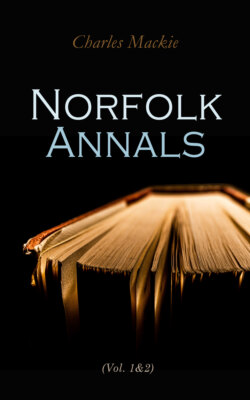Читать книгу Norfolk Annals (Vol. 1&2) - Charles Mackie - Страница 241
На сайте Литреса книга снята с продажи.
MARCH.
Оглавление7.—Died, in her 89th year, Mrs. Mary Murray, widow of Dr. John Murray, of Norwich. “Possessing a disposition congenial with that of her late excellent husband, her long life was distinguished by the practice of benevolence and of every Christian virtue.”
8.—A new tragedy, entitled “Bertha,” written by Mr. Edward Ball, of Norwich, was produced for the first time at Norwich Theatre.
—A public meeting was held at the Guildhall, Norwich, at which a subscription was raised for the relief of the distressed inhabitants of the Scilly Islands. It amounted to £315.
9.—The Hon. Edward Harbord, the unsuccessful candidate for Norwich at the previous General Election, arrived in the city and dined with the King and Constitution Club at the Maid’s Head Inn. He was elected a member of the club.
—At a meeting of merchants, manufacturers, and tradesmen, held at the Guildhall, Norwich, it was resolved to petition Parliament to amend and alter the Acts for the Relief of Insolvent Debtors in England.
15.—Capt. Manby exhibited before the Mayor and Corporation of Yarmouth “a light fire cart, provided with the necessary apparatus ready on the alarm of fire, to be applied by one man.”
—Mrs. Faucett, formerly a permanent member of the Norwich Company, and afterwards of Covent Garden Theatre, appeared at Norwich Theatre as Widow Cheerly (“The Soldier’s Daughter”). During her engagement she also impersonated Clara (“Matrimony”), Florinda (“The Apostate”), Mrs. Haller (“The Stranger”), Lady Contest (“The Wedding Day”), and Ellen Rosenberg.
16.—The foundation stone of Prince’s Street Chapel, Norwich, was laid by the Rev. John Alexander. A brass plate was placed in the stone with the following inscription:—“This plate was deposited on the 16th day of March, 1819, and in the 59th year of the reign of George III., in the foundation stone of the Protestant Dissenting Chapel, erected on a piece of freehold ground in the city of Norwich, and in the parishes of St. Michael-at-Plea and St. Peter Hungate, by the congregation attending the ministry of the Rev. John Alexander.” The building was opened for service as the Independent Chapel on December 1st, 1819, when sermons were preached by the Rev. Thomas Raffles, A.M., Liverpool, and the Rev. John Leifchild, of Kensington.
20.*—“We understand that the cooping of freemen preparatory to election of nominees for the Long Ward, Norwich, on the 31st inst., commenced more than a fortnight ago. This practice has hitherto been treated with much indifference, but as it is likely to be annually resorted to, every sincere friend of the purity of election and of the real interests of the poor men who are thereby taken from their families and from their ordinary occupations, must view it in a very serious light.” The election of common councilmen commenced in the week beginning March 28th. “The consequence of this year’s struggle has been to continue the ascendancy of the ‘Blue and White’ interest in the Common Council. Both parties succeeded in creating a superabundance of noise and confusion and in putting themselves to a vast deal of trouble, vexation, and expense. In length of purse the ‘Blues and Whites’ appear to possess a decided advantage over their ‘Purple and Orange’ opponents, and cooping, bribing, and corrupting were freely and openly practised.”
29.—Mr. Richard Mingay, a well-known member of the orchestra at Norwich Theatre, appeared upon the stage as Crack in the farce of “The Turnpike Gate.”
